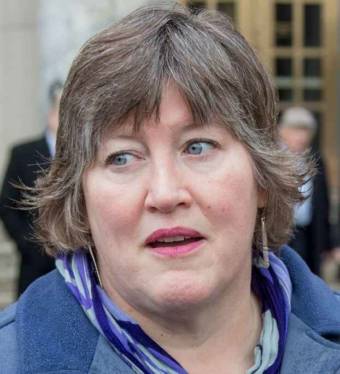- House District 34
- Ed King
- Andi Story
- House District 33
- Sara Hannan
Age
59
Family
Mark Stopha (husband)
Occupation
Retired high school social studies teacher. Now, LegislatorPrevious government experience or community involvement
One term member of the Alaska House of RepresentativesHighest level of education
B.A. plus 90 creditsDo you support ballot proposition 1?
Yes
Do you support ballot proposition 2?
No
What new quarantine skill or hobby have you acquired over the last few months?
I learned to make pho and adobo. Pho takes a lot of time and moose adobo is perfect. The vinegar and slow cooking make it so tender.

Why are you running?
I am running for office to serve Alaska and make sure we come up with a sound fiscal policy to meet Alaska’s needs.
COVID-19
Has the Alaska Legislature done enough to address the impacts of the COVID-19 pandemic? Why or why not?
No, we have not done enough because we don’t have the money to take that burden on. We have thus far depended primarily on federal monies to address it, and right now those federal monies are not meeting Alaska’s needs. Our economy runs a little different than other places. Even if the COVID pandemic is resolved sometime this winter, our economy and fisheries and tourism aren’t going to be back until at least next summer. So I do believe that the state of Alaska is going to need to address the impacts of COVID-19.
State budget shortfalls
How do you think the Alaska Legislature should address state budget shortfalls in the upcoming legislative session?
I believe we need to institute a number of new revenue measures and increase some of the current revenue measures that we have. We have no general broad state tax of any sort in Alaska. We’re the only state in the union that doesn’t. I’m an advocate for an income tax. But we also need to institute some increases to taxes we currently have. Everything from our oil revenue taxation structure — there’s a ballot proposition that might restructure that, but if not, the legislature needs to — I think motor fuels tax. I’ve been the prime sponsor of increasing tobacco taxes and integrating vaping into our tax regime. Currently in Alaska, nicotine vaping is not taxed at all, because our nicotine taxes define it by type of nicotine being consumed, and the last time we did nicotine taxes vaping didn’t exist. So a number of taxes to address our deficits.
Education
How can Alaska hope to improve education for students amid ongoing budget cuts?
I don’t think they can, unless we start to address the fact that schools simply reflect communities and most communities in Alaska have significant needs and demands for family supports, to address trauma in family structures, to be able to address deficits in education, to be able to instill local control and support for indigenous language instruction programs. And all of that takes money. So unless we wrap our heads around the fact that how we deal with public service and social service impact our education, we can’t just address education. It reflects what’s going on in our communities and they need to be made healthier. We need to instill healthier outcomes for both our young people and our old people so that we can have education thrive and have positive measures for that.
Most critical district issue?
What do you believe is the most critical issue facing your district and how do you plan to address it if elected?
Our most crucial issue comes back to fiscal. We don’t have enough money to address education. We don’t have enough money to address addiction. We don’t have enough money to address our marine highway system. And all of those things are critical in our — in my election district — and across the state. But all of those stem from us having a sound fiscal policy so we can talk about specific policies and programs that we want to see increased. We’re a pretty diverse economy in Juneau, but we are the capital seat so we have a lot of impacts during the time of pandemic. We’re a fishing town, we’re a tourism town, we’re a mining town. The only thing that we aren’t actively engaged in in this community is oil. But oil and gas economy pervades Alaska. So we’ve got significant economic issues to address so that the day-to-day needs of Alaskans can be met.